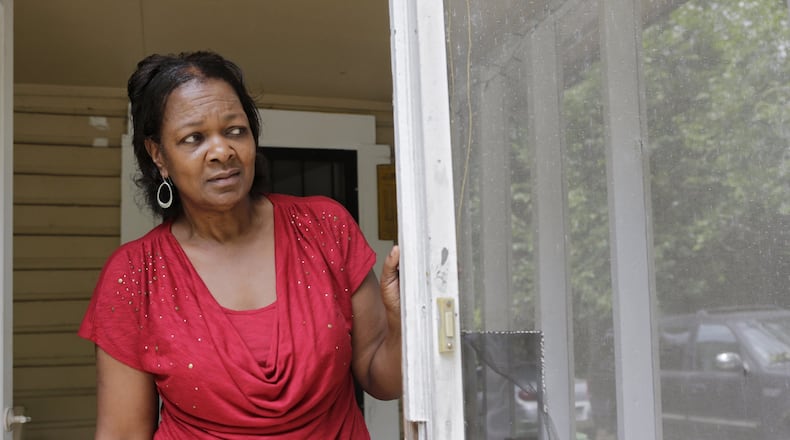Her mother called the bungalow on Lindsay Street “that old shack.” When she died, Patricia Campbell moved in and called it home.
The problem was, her mother had no will. For about six years, Campbell paid taxes, insurance, and made repairs when she could before learning that under Georgia law, a nephew she hadn’t seen in years owned half of it. And he didn’t even know it.
“I felt like, ‘Why? Why? This man isn’t part of my life’,” Campbell said. “He didn’t even go to my mom’s funeral.”
In the blighted neighborhoods just west of Atlanta's downtown, decades of informal agreements between family members, do-it-yourself legal work, unpaid taxes and fees have turned figuring out who owns properties there into complex legal mysteries.
That's stymied the efforts of Campbell and other residents to get funds to fix up their homes, left them vulnerable to predatory investors, and made the hard work of revitalizing these long-neglected neighborhoods even more difficult.
The Arthur M. Blank Family Foundation, the Home Depot Foundation, Invest Atlanta and other groups have targeted the neighborhoods around the new Falcons stadium for major infusions of money, but before any redevelopment, anti-blight or homeowner repair programs take place, they have to to deploy lawyers to settle who owns these properties.
“You can’t do anything unless you own it,” said Bill Dodson, a real estate attorney who said he has worked on clearing title on well over 100 west-side properties for the Blank foundation. “It’s just that simple.”
While other neighborhoods see ownership problems with 5 percent of their homes, that figure is closer to 60 percent for some 300 owner-occupied properties in these neighborhoods, according to figures from the Blank foundation.
Ownership of these modest homes is scattered across generations of family members, cast into doubt by bad paperwork, or complicated by liens for late taxes and other bills. To fix these problems, attorneys have to track down every person with a potential stake in the property, an expensive process that can take months or longer.
As rents on homes just blocks away skyrocket, settling ownership in these downtrodden neighborhoods is growing more urgent. Investors are moving in, and residents of these overwhelmingly black communities know that unless they're savvy, they risk losing out on their one big chance at long-term financial stability.
People who lack clear property title are also at risk of being scammed out of their homes or forced to sell. The intown neighborhoods around the stadium already have some of the highest concentrations of absentee or investor ownership of any in the city.
“This is about the land,” said resident Mamie Moore, president of the English Avenue Neighborhood Association. “As an individual, I view it with a clear, cold political eye as to what’s happening. And gentrification is happening.”
Title problems compounded over generations
For decades in English Avenue and Vine City, hiring a lawyer to hash out who owned a house was not worth the expense. Homes are still rarely worth more than a few tens of thousands of dollars, and while crime has declined, many consider it too dangerous to live in the properties that their relatives left them. Heirs settle their problems among themselves or walk away.
In other neighborhoods, routine buying and borrowing is a safeguard against faulty titles. For generations, however, few banks loaned money to buy homes in black areas such as those west of downtown, so the legal work that was required to clear up ownership did not take place.
Poverty made the problem worse.
“Folks don’t have the money to go through probate court and don’t have a will,” said Frank Fernandez, the Blank Foundation’s vice president of community development.
These factors lock away thousands of dollars’ worth of potential wealth from the occupants of these homes. Without clear ownership, banks refuse to issue loans, buyers withdraw their offers, and homeowner repair programs will not give grants.
They also frustrate revitalization attempts. Anyone who wants to cobble together parcels of land to build a park, apartment complex or shops has to go through the onerous process of clearing title.
Foundations help 17 households
Campbell realized a nephew owned half of her home when a tree limb fell on her roof. Her insurance company issued a check for repairs in both of their names, which meant she couldn’t deposit it until a lawyer helped her get her nephew’s permission, she said.
For Campbell and other residents, years of paying a house’s insurance or tax bill does not give an occupant greater ownership rights, and neither do verbal agreements, said Claude C. Davis II, an attorney with The Georgia Heirs Property Law Center, which was launched by legal nonprofit Georgia Appleseed Center for Law & Justice.
“These are common misconceptions, regardless of socioeconomic background,” Davis said. Most people don’t understand how complex property ownership can be.
So far, Davis has helped Campbell and 16 other households clear up title through the homeowner stabilization program of the Westside Roots Initiative, an effort by the Blank and Home Depot foundations and Invest Atlanta to give grants of up to $50,000 for repairs, as long as residents stay in their homes long-term. The project set aside funds for legal assistance after seeing how city code enforcement officers and homeowner assistance programs groups struggled to establish who owned these properties.
“My fear is that as properties come up in value, there are those who are sharks that know how to prey on people who will come,” Fernandez said. “We want to make sure that homeowners don’t get taken advantage of.”
‘A chance to build a legacy’
For the working-class families west of the Falcons stadium, ownership of even a modest home can change the course of their lives. When Campbell’s mother, Mary A. Baker,purchased the home she had rented for a decade, it was a sign the life-long English Avenue resident had straightened out her chaotic life.
“This house really represented some stability for my mom. This was a huge step for her,” Campbell said.
For Campbell, it meant she had a place to live in 2009 after she lost her job for the second time in as many years. The administrative assistant at Georgia State University now lives in the 800-square-foot home with her daughter and grandchildren.
“I’d be living paycheck to paycheck,” Campbell said. “I don’t want to go back to that.”
Homes in these neighborhoods are so inexpensive that even residents with fixed incomes can use them to build wealth. Retired elementary school teacher Rosario Hernandez purchased the tax lien on the house where she now lives for about $4,000 in 2012 when it was a leaky shell. Squatters had burnt the floors when they set fires to keep warm and defecated against the walls.
Now the sunny living room is filled with house plants and gardening books, and Hernandez’s grandchildren build forts among the raised beds of eggplant, okra, basil and tomatoes in her backyard.
Hernandez was denied a loan to make repairs because the attorneys she hired did not to complete the legal work needed for her to take full title to the house, she said. Westside Roots helped spot the problem, and she’s now confident that she won’t lose the property.
“The bottom line is they can’t take it from me,” Hernandez said.
Campbell feels more secure as well. Her lawyer reached a deal with her nephew that allowed her to fix the damage left by the tree and make repairs through Westside Roots. The crumbling driveway needs shoring up, the bathroom needs repair, and the lead pipes and asbestos need to be torn out. It would be nice to replace her stolen central air conditioning unit too, she said.
With luck, Campbell said, she’ll be able to leave it to her own children.
“It’s a chance to build a legacy,” Campbell said.
About the Author


